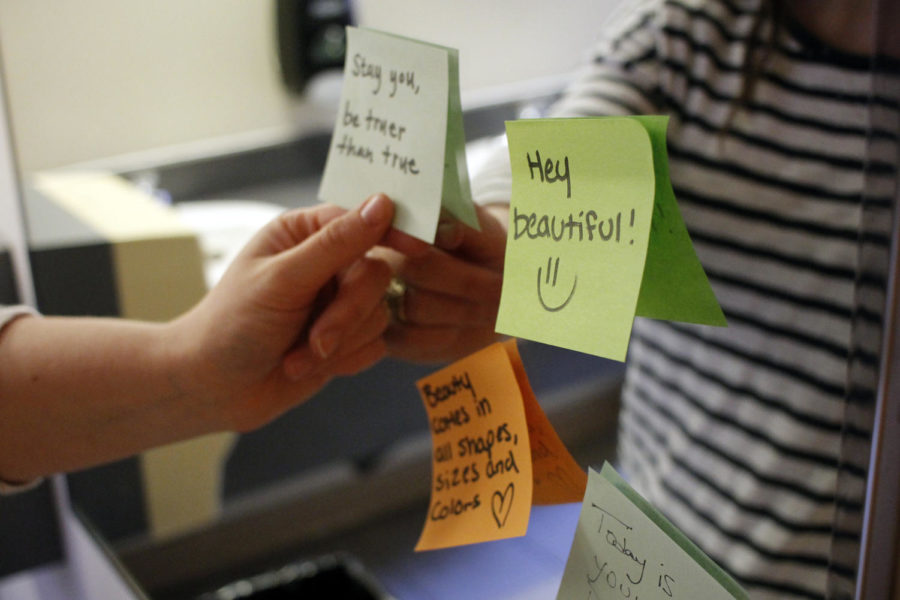Develop a positive self-image
The way someone looks at and thinks about themself couldn’t be anymore important for both women and men. Placing small notes around the bedroom or bathroom with words of encouragement can help someone get through the day.
February 25, 2015
There was an awkward pause at the ISU Body Image and Eating Disorder Awareness table at the top of the stairs of the Memorial Union on Feb. 13, as ISU students struggled to write down something they loved about themselves on a craft foam heart.
“I could write 30 things that I thought was beautiful about [each student who came to the table],” said Rachel Dalton, co-president of ISU Body Image and Eating Disorder Awareness. “To see a student struggle to find even one thing that they loved about themselves to write down was extremely hard for me.”
Although negative thinking and self-talk opens a door to depression and eating disorders, the human brain is naturally conditioned to recognize the negative as a survival instinct.
ISU clinician and academic adviser Alison St. Germain volunteers her time and serves as an adviser for ISU Body Image and Eating Disorder Awareness and understands the pervasive nature of self-talk, both positive and negative.
“It is important to have a positive self-body image as it impacts everything … It impacts our happiness,” St. Germain said.
ISU Body Image and Eating Disorder Awareness believes students can teach themselves happiness and cultivate a new way of positive thinking and with the help of co-presidents and advisers, here are a set of 4 mantras to encourage students to reshape positive thinking this February:
-
I am enough. St. Germain suggests surrounding yourself with happy, loving, caring people who bring positive energy and avoid comparing themselves to others or social media. “The best thing to remember is that you are way more than what your body is and you have a lot more to offer than what your body offers,” said Kelsey Finn, sophomore in pre-dietetics and member of ISU Body Image and Eating Disorder Awareness.”Really dig deep and find the characteristics you love about yourself and make those characteristics shine.”
-
Rock your body. 91 percent of college women have dieted and of this percent, 22 percent diet often or always, and 50 percent of men want to change their physique. It is becoming more and more imperative that students redefine what normal and healthy bodies look and feel like. Remembering that mental and emotional components of being healthy and loving your body are as crucial as the physical component. To catalyze this mantra, ISU Body Image and Eating Disorder Awareness will be hosting a “Rock Your Body Party” at State Gym Feb. 25 from 2 to 5 p.m. in honor of National Eating Disorder Awareness Week.
-
Go slowly. Whether it be the faster students can walk across campus or the faster students can graduate, for many students on our campus, faster is better. However, this can have toxic results that hide the value of quality work. Take a deep breath, re-evaluate your day, your homework assignment or the route across campus and remember to take your time. Not only has this proven to reduce stress, but it will also strengthen your resolve.
-
Be open. Negative self-talk and body bashing are essential forms of conversation among friend groups on campus. “If you’re not body bashing, it’s almost like you’re missing out on the conversation” said Chloe Lundquist, co-president of ISU Body Image and Eating Disorder Awareness. For many students, replacing negative self-talk with positive self-talk will feel foreign and strange. It may send questionable looks of peers in your direction but it will also provide a beneficial mindset that will improve mental and emotional well-being.
“I believe over time, if positive things are repeated, one will internalize them and start to believe them” St. Germain said. A campus of healthy students needs to be a campus where students value their physical, mental and emotional health. To value that, students must value themselves.”







